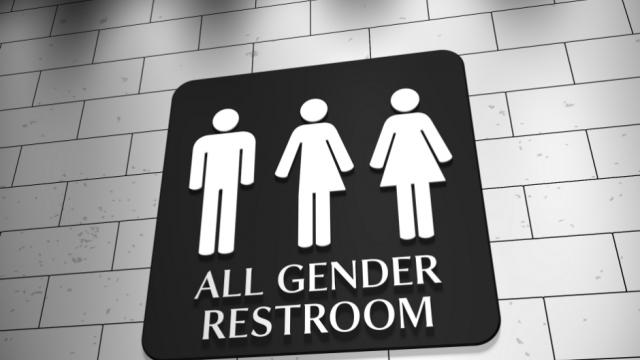
In spite of support from the governor and social conservatives, the Texas legislature failed to pass a “bathroom bill” last week after vocal opposition from, among others, professional sports franchise owners. The defeat continued a trend over the last half century of sports contributing to the advancement of civil rights in the conservative Deep South.
Senate Bill 6, which would have required people to use public restroom facilities based on the sex listed on their birth certificate, advanced to the statehouse but did not come to a vote, thus killing the legislation. Business interests, including three major league sports franchises, voiced strong opposition.
“I don’t think we need it,” Houston Texans NFL owner Bob McNair said, adding, “I think there are more important things going on in the world.”
Mark Cuban, the outspoken owner of the Dallas Mavericks basketball team, said: “We can only use the excuse of having crazy, entertaining state politicians who are merely a sideshow for so long.”
And Jim Lites, the president and CEO of the Dallas Stars, the city’s hockey team, was even more assailing. “The Dallas Stars stand strongly opposed to any legislation perceived as discriminatory, including proposed bathroom legislation,” he said.
Sports in the Deep South is an integral part of the culture, similarly to church. The Dallas Cowboys, not a New York or Los Angeles sports franchise, is the most valuable sports franchise in the world, valued by “Forbes” at $4.4 billion. Football mania extends to the amateur levels of competition, with high school football being the center of social life in Texas; it's not just Hollywood portrayals in movies and TV shows like “Friday Night Lights”. In fact, a $72 million high school football stadium will open this year in Katy, Texas.
Neighboring Louisiana produces more pro athletes per capita than any other state, and the University of Alabama football team’s spring 2017 scrimmage drew almost 75,000 spectators. Sports has been intertwined with the region’s civil rights turmoil and disputes over the last half century – and notably, sports institutions’ stances on controversial issues have moved the needle on civil rights over that period.
Most recently, the NBA pulled its all-star game from North Carolina in 2017 following the state’s passage of another “bathroom bill” last year. Bowing to widespread pressure, North Carolina repealed the law in March.
The University of Mississippi, commonly known as Ole Miss (a term with racial and slavery connotations) has been in the forefront of distancing the university from its disreputable past. In the 1990s, the university prohibited flag poles at its games in order to stop Confederate flags from being waved. This followed statements from the head coach that the display hurt the school's recruiting of African-American athletes.
In 2015, Ole Miss linebacker C.J. Johnson told ESPN of Confederate flag displays, “You might as well just put a big tag on the front of your car or hang a big flag on the back of your car and just say the N-word." Johnson played with the Super Bowl champion New England Patriots last season.
As the Deep South kicked and screamed to prevent the integration of its schools and businesses following the 1954 Supreme Court ruling in Brown v. Board of Education, sports became a catalyst in finally nailing the proverbial coffin shut.
The NFL awarded Atlanta with an expression franchise in 1965. Major League Baseball came to the city a year later. In the beginning of that decade, Atlanta Mayor Ivan Allan Jr. sought to rehabilitate the city’s image, promoting business development over racial segregation. The city adopted its famous slogan, “The city too busy to hate.” In the same decade, two established Jewish Atlanta real estate figures opened an integrated hotel with shopping center that hosted visiting teams.
The impact of sports in another Deep South city was even more dramatic. In 1965, the American Football League held the all-star game in New Orleans. Days prior to the game, several black players tried to take advantage of the city’s famous tourist locations, including the French Quarter. The players complained of being denied taxi service, denied entry into some restaurants and bars, and even being threatened at gunpoint to leave the premises of one French Quarter establishment. In response, the black players boycotted the game, forcing the AFL to move the game out of the city.
Two years later, the NFL awarded New Orleans with an expansion franchise, but this was only after NFL Commissioner Pete Rozelle’s assistant, Buddy Young, an African-American, visited to investigate the city's racial climate. After eating in the main dining hall of a French Quarter establishment, Young reported favorably on the city, leading to the Saints becoming an NFL franchise in 1967.
As demonstrated by recent events involving Colin Kaepernick and other NFL players sitting for the national anthem in protest of racial violence and injustice, sports remain inextricably intertwined with civil rights in America. Kaepernick is currently a free agent, something his supporters attribute to his social stance rather than his ability. But as the NFL season prepares to kick off Sept. 7, fans are witnessing a rise in pre-season protests with multiple players from the Philadelphia Eagles and Cleveland Browns demonstrating during the national anthem. Since NFL viewership averages about 1.5 million per game, the current wave of protest indicates that civil rights concerns will remain at the forefront of America's attention spans throughout the 2017 season.
3 WAYS TO SHOW YOUR SUPPORT
- Log in to post comments











